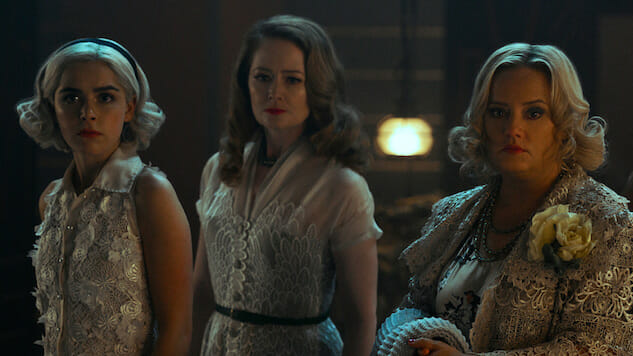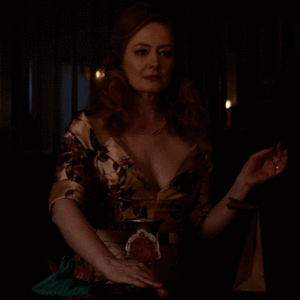Why Chilling Adventures of Sabrina Is Now Ready to Join Charmed and Legacies in Hexing the Patriarchy
Spellmans & Saltzmans & Charmed Ones, Oh My!
Photo Courtesy of Netflix
Sabrina: Why do you serve him?
Lilith: It’s all I’ve ever known.
Sabrina: What a terrible, weak reason. — Chilling Adventures of Sabrina, “Chapter Nineteen: The Mandrake” (2.09)
![]()
Warning: Spoilers for Chilling Adventures of Sabrina Part 3 (all of it), Charmed Season 2 (half of it) and Legacies Season 2 (half of it) follow.
When Chilling Adventures of Sabrina, Legacies, and Charmed (the reboot) debuted within weeks of one other back in October 2018, it was easy to read their timing as some kind of darkly meaningful feminist magic. It was the middle of the Kavanaugh hearings, abortion rights and Title IX protections were being dismantled the country over, and the very moderate successes of the #MeToo movement were nevertheless finding certain (#notall) men screaming witch hunt at whoever would listen. If any moment in American pop culture’s latest long, dark teatime of the soul called for a resurgence of specifically witchy female fury, that was it. That their triumvirate appearance came exactly one year after Vulture’s Kathryn VanArendonk had explicitly called for a witchy renaissance in American pop culture (“The magic of the witch in this particular moment,” she wrote in 2017, “is that both the traditional, villainous witch and her feminist, heroic opposite are equally alive in the cultural consciousness”), well, that just made the moment that Sabrina, the Charmed Ones, plus Hope, Josie, and Lizzie cast their first hexes against the patriarchy feel all the more magically pre-ordained.
While the witch trend that started that cold October has, for better or worse, only grown—among others, Netflix’s gorgeous-but-tone-deaf Siempre Bruja joined the conversation early in 2019, Disney’s “witches are just another type of weirdo” animated joint The Owl House debuted earlier this month, and Freeform’s long-awaited alt-history witch-soldier drama Motherland: Fort Salem is set to premiere on March 18—the mystical aura around the trio of series that started it has, like the sharpest notes of the #MeToo movement, faded a bit. These days, CAoS, Legacies and Charmed are all primarily fun, fan-driven genre shows—still witchy, but working more to maintain their own broadcast longevity than to spearhead a cultural revolution.
This isn’t to say they’ve haven’t remained shows of their time, which is our time, which is tense and messy and deep in the throes of a complete upheaval in how we understand gender and power. They have. And for the most part, they’ve all stuck to their original “witchcraft as post-2016 female empowerment” mission statements: The teen witches of Legacies continue to thrive by working together and supporting one another in the face of the supernaturally toxic patriarchal sludge that keeps spitting mythical monsters out in Mystic Falls week after week. (Don’t ask; just watch.) Charmed, in its positioning of Macy, Mel and Maggie’s witchy sisterhood as a reflection of intersectional, socially progressive girl power, continues to be heavy-handed, if at least endearingly so (and, thanks to Season 2’s move to SafeSpace Seattle, mostly winkingly). And Chilling Adventures of Sabrina?
Well, Chilling Adventures of Sabrina continues to be a complete puzzle.
Recently returning for its third season (or Part 3, as Netflix so arcanely styles it), Riverdale’s slightly more occult sister series has, since it first premiered, been tonally inscrutable. As gleefully retro as it is in its malt shop and monster movie marathon aesthetics, CAoS has been just as gleefully modern (read: woke) in its approach to social politics, both witchy and otherwise. At least, between Sabrina’s (Kiernan Shipka) enduring skepticism of the Church of Night’s patriarchal traditions, Ambrose (Chance Perdomo), Nick (Gavin Leatherwood) and the rest of the coven’s uncomplicatedly fluid sexualities, and the overwhelming Bad Bitch vibes just absolutely pulsing from Zelda (Miranda Otto), Lilith (Michelle Gomez), the Weird Sisters (Tati Gabrielle, Adeline Rudolph, Abigail Cowen), and even Hilda (Lucy Davis), modern (read: woke) is what CAoS has seemed to want to be.
In practice though, the story all these woke-and-witchy characterizations have been serving were, until this newest season, something entirely different.
How different? Well, for all CAoS revels in Zelda’s cooler-than-thou hauteur, or glories in Prudence’s sizzling sense of superiority, or delights in Lilith’s acid one-liners about the fragility of the male ego on one witchy hand—and in Sabrina’s ever plucky refusal to be beaten down by the brittle men who would control her on the other—it isn’t until late in the second season (that is, Part 2), when Father Blackwood (Richard Coyle) is kickstarting the process of reforming the Church of Night to better reflect his “regressive and misogynist” agenda (Ambrose’s words) and the Dark Lord/Lucifer (Luke Cook) is starting to make known his grand plan to establish dominion (over not just humankind, but all witches, too), that CAoS’s many signifiers of anti-patriarchal female power make a move towards becoming something more than just signifiers.
Until then, Zelda’s hauteur is used either to bark Sabrina/Hilda down or to gain a personal edge over other women in the coven, the Weird Sisters’ power troika has value mostly as a sex thing (which gives them a personal edge over other women), and Lilith’s scheming as the Greendale-bound Madam Satan is done entirely in the service of a Hell-bound man who has spent milennia promising her that, if only she’ll let him keep his cloven hoof planted firmly on her neck, she, too, might one day wield the power he does. (“Marriage is nothing less than the complete obliteration of a woman’s personhood,” she scoffs at an earnestly proposing Alexis Denisof in the second season. And yet, gotta keep that edge!)
By the time Blackwood has the Anti-Pope (a perfectly cast Ray Wise) assassinated, most of the coven’s core characters have cottoned on to the fact that maybe, just maybe, the bad Father’s canonical hatred of women might have implications outside his personal bubble, but by then the show has directed so much energy into painting the Church of Night’s subversive take on Catholicism (and Catholicism’s influence on secular language and culture) purely as tongue-in-cheek fun that it takes massive effort to turn the narrative ship around. To wit: Even as the misogynistic, anti-witch agendas of both Blackwood and the Dark Lord grow increasingly obvious, it still takes Zelda marrying and being spelled into Stepford Wife submission by Blackwood (improbable!), Prudence and her sisters torturing Ambrose for a false confession in the hopes of staying in the good graces of the Church’s all-male Council (incomprehensible!), and Lilith relinquishing what little agency she’d gained in her two seasons spent alone on Earth in order to fulfill the final step of a prophecy that would allow Lucifer back into the mortal world (inexplicable!) before any of them muster the wherewithal to take a step back and consider that perhaps the path they’re on, well, they’re powerful enough to just step off.

Alas, a moment of self-reflection come far too late. (Source: CAoS on Giphy)
Even after Blackwood is run out of town and Lucifer is trapped in Nick’s body, which Lilith takes with her back to Hell, it takes the bulk of this latest season—up to and including Prudence and Ambrose bringing a sapphic practitioner (Skye P. Marshall) of New Orleans’ “hoodoo-vodou magic” to town, Sabrina missing the Apocalypse, and Zelda and Hilda both literally dying—for what remains of the Greendale coven to truly start grappling with the extent to which they had, for centuries, been brainwashed by the Dark Lord’s/the Church of Night’s patriarchal demands. It is only in the last possible moment, in the last act of the season’s last episode (“Chapter Twenty-Eight: Sabrina is Legend”) that CAoS finally gives its witchy protagonists, in the three-in-one form of of the witch goddess Hecate, a new, female-rooted path to the kind of power needed for them to find a new, less toxic way to work magic in the world.
On the one hand, it has been excruciating to wait for Chilling Adventures of Sabrina to finally reach the page it seemed so clear (to me, at least) it had opened to when it first premiered. Witches! How was Hecate not on the table even once in the last three seasons? The Dark Lord (and all his warlock followers) been scamming you! What a storytelling loss.
On the other hand, so much of the turmoil around real-world gender politics right now is rooted in misogynist thinking deeply enmeshed in our everyday patriarchal culture that it’s not always easy for people—outside the dominant cis/white/het/abled male bubble—to recognize when we’re helping the system work against us, let alone for us (especially cis/white/het/abled women) to start deprogramming ourselves. I personally wasn’t looking for a witch show that used its femme-magic mythology not to subvert the patriarchy, but rather to reflect its infuriating reality. ButI guess now that we’re here, I can appreciate the fact that, as chaotic a journey as it took, CAoS at least used that, er, chaos to reach a reasonable, patriarchy-hexing destination.
Ultimately (or at least, as ultimate as a mid-run conclusion can get), if the triumvirate arrival of CAoS, Charmed, and Legacies in October 2018 can be read as a sign of anything, it should be more as a reflection of our current culture’s psychic agreement of witches as blank slates for stories about female anger and feminist reclamation of power—whatever form, confounding or not, those stories might take—than as any kind of catalyst for cultural explosion on their own.
That said, even after the Charmed Ones’ powers being diminished so they could go into witch-ness protection (don’t shoot the messenger; that’s their joke), Charmed is still managing to mine its new SafeSpace Seattle setting for some progressive and low-key funny witch-centric storytelling, while Legacies keeps swinging for the supernatural fences, bouncing from Daedalus’s Labyrinth as an IRL 80s arcade game, to witch depression as prophylactic against Krampus’s malevolent Christmas spirit, to all the teen witches in school coming together to celebrate Coven Day/support Wade the (literal) Fairy in his official coming out, all without losing the witch-power plot, so that’s where my personal bingeing energies are likely to keep going. At least, that is, until Motherland: Fort Salem enters the conversation…
Until then, Chilling Adventures of Sabrina (Parts 1-3) is available to stream on Netflix. Legacies and Charmed air on the CW on Thursdays at 9 p.m and Fridays at 8 p.m., respectively.
Alexis Gunderson is a TV critic and audiobibliophile. She can be found @AlexisKG.
For all the latest TV news, reviews, lists and features, follow @Paste_TV.







































